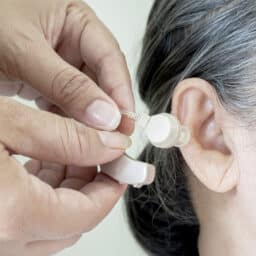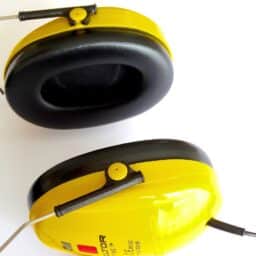How Grime and Wear Impact Your Hearing Aids

Keeping your hearing aids clean isn’t optional if you want the best performance. If you’re a new hearing aid user, you might not realize how much the environment can impact your new hearing device. First, let’s explore some of the impacts of wear and tear on performance. How Does Wear Impact Your Hearing Aid? The…
Tips for Navigating Airport Security With Hearing Aids

Nearly 28.8 million Americans could benefit from using hearing aids. New hearing aid users may have several questions about daily activities with hearing aids. When traveling, they may be curious about how to navigate security with them. The good news is that hearing aids are rarely a cause for concern at airport security, and with…
Are My Sunglasses Interfering with My Hearing Aids?

If you wear both hearing aids and sunglasses, you may wonder if your sunglasses will interfere with your hearing aids. Nearly 28.8 million Americans could benefit from wearing hearing aids, but many people don’t take advantage of their benefits for various reasons. Hearing aids and sunglasses occupy similar real estate around your ears and can…
How Does Loud Noise Damage Hearing?

The Occupational Safety and Health Administration (OSHA) states that prolonged exposure to sounds above 85 decibels (dB) can lead to permanent damage. Everyday workplace noises, like those from heavy machinery, power tools, production lines and loud music in entertainment venues, put many workers at risk. Without proper precautions, workers may develop hearing loss or tinnitus….
How to Protect Your Hearing During a Concert

According to the World Health Organization (WHO), “Over 1 billion young adults are at risk of permanent, avoidable hearing loss due to unsafe listening practices.” This includes going to concerts without being adequately prepared. Below we review how to protect your hearing during a concert. Wear Hearing Protection Perhaps the number one thing you can…
Habits to Prevent Hearing Loss

Hearing loss often progresses slowly, making it difficult for many people to detect early on. In the United States, about one in eight individuals aged 12 and older experiences hearing loss in one or both ears. The most common type of hearing loss is noise-induced hearing loss (NIHL), which results from prolonged exposure to loud…
I’m Tired All the Time, Do I Need a Hearing Test?

Constant fatigue can be incredibly frustrating, and it’s easy to assume that stress, lack of sleep or a hectic schedule are to blame. However, hearing loss might be the surprising reason behind your persistent tiredness. How Can Hearing Loss Cause Tiredness? Hearing loss leads to a number of communication difficulties, from trouble understanding speech sounds…
Is Potassium Good for Your Hearing?

Potassium is an essential nutrient that plays a key role in maintaining good health. Some research has indicated a link between higher potassium intake and a lower risk of hearing loss. Potassium Intake and Hearing Loss A study published in 2019 examined the association between hearing loss and potassium intake. Researchers looked at participant data…
How is Machine Learning Helping with Speech and Background Noise Differentiation?

Understanding speech is one of the biggest challenges people with hearing loss face. While hearing aids significantly help in this area, there is still room for improvement. Researchers are looking to new technology, such as machine learning, to enhance listening ability for those with hearing problems. Hearing Loss and Speech Hearing loss can affect your…
How to Protect Hearing Health with Diabetes

Diabetes affects millions of Americans each year. It occurs when your blood sugar is too high. There are three types of diabetes: Type 1, Type 2 and gestational diabetes, which occurs during pregnancy. Poorly controlled diabetes can lead to a variety of different health problems, including cardiovascular issues, kidney failure, and nerve damage. It also…